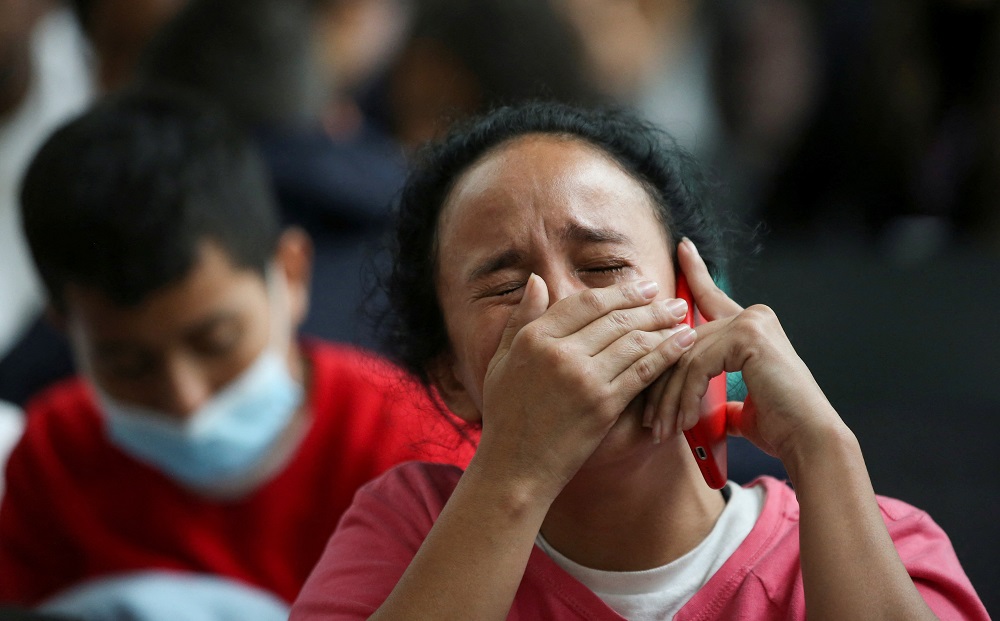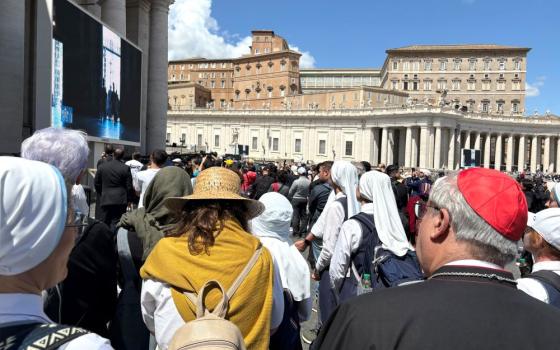
A Colombian migrant woman reacts at the El Dorado International Airport in Bogota, Colombia, May 11, 2023, after being deported from the United States, as the U.S. prepares to lift the COVID-19 era restrictions known as Title 42, that have blocked migrants at the U.S.-Mexico border from seeking asylum since 2020. (OSV News/Luisa Gonzalez, Reuters)
As Title 42 drew to its scheduled close May 11, Catholic immigration advocates called for public policy on immigration that recognizes the humanity of migrants and asylum-seekers.
Title 42 is a part of federal U.S. public health law granting the federal government some authority to implement emergency action to prevent the spread of contagious diseases by prohibiting some migrants from entry. It was scheduled to expire in tandem with the end of the federal public health emergency declared in 2020 for COVID-19.
"In the coming days, as new policies are implemented and the post-Title 42 landscape unfolds, CLINIC will continue to repeat Pope Francis' words: we are 'brothers and sisters all,'" said Anna Gallagher, executive director of the Catholic Legal Immigration Network, or CLINIC.
"The men, women, and children who come to our borders are made in the image and likeness of God, with equal and untouchable dignity. We know this based on our faith," Gallagher said. "We will continue to pray and speak out for immigration policies that respect that truth, including the right to seek asylum freely, fairly, and safely."
Heidi Cerneka of Maryknoll Missioners, which serves migrants on the U.S.-Mexico border, said in a statement that "the recent proposed asylum policy by the Administration seeks only to reduce the numbers at our border."
"It does not address people who have fled persecution in their countries of origin, nor does it consider our obligation to protect them," Cerneka said in a May 11 statement from Maryknoll's Office for Global Concerns. "As citizens of the United States, as global citizens, and as people of faith who defend human dignity and the sacredness of each person, we must ask critical questions and keep migrants, justice and life at the center of all we do."
In a message posted on Twitter late May 10, Bishop Mark J. Seitz of El Paso, Texas, chairman of the U.S. bishops' migration committee, urged Catholics and all people of goodwill to welcome the migrants coming into the country with the end of Title 42 as long-lost relatives.
"Imagine some long-lost family members show up at your door. What would you do?" he asked. "We are all part of the human family and the immigrants coming to the door of our country right now are our long-lost brothers and sisters.
"This is the time El Paso for us to live up to our reputation of welcome and hospitality. We are already in the process of welcoming," he continued. "Right now our diocesan family is opening four parish-based shelters and with your help we're about to open another one. All of our parishes and priests are working to support the effort by preparing food, by volunteering at one of our shelters and by praying for the newcomers among us. The next several weeks could be challenging, but we are not alone in this. The Lord is at our side."
Advertisement
Then-President Donald Trump implemented Title 42 in 2020 at the onset of the pandemic, but the policy was seen as part of his administration's broader attempts to reduce migration. Prohibiting migrants at the southern border from entering the U.S. under Title 42 was criticized by some public health experts, who argued the policy was politically motivated rather than evidence-based virus mitigation.
Since its 2020 implementation, Title 42 has been invoked more than 2.7 million times to expel migrants, including those seeking asylum, according to U.S. Customs and Border Protection data.
The new rules issued by the Biden administration will presume individuals to be ineligible for asylum in most cases if they cross the border illegally or fail to first apply for safe harbor in another nation, similar to a Trump-era policy dubbed the "transit ban." Migrants will be asked to use a mobile app to apply for asylum, and some immigration advocates have raised concerns about data privacy and whether the app is accessible to migrants and asylum-seekers. The administration also will expand expedited removal processes under Title 8, which is part of the U.S. code addressing immigration law.
In a May 11 press briefing at the White House, Secretary of Homeland Security Alejandro Mayorkas told reporters "the transition to Title 8 processing will be swift and immediate."
"We are clear eyed about the challenges we are likely to face in the days and weeks ahead," he said. "Ready."
Lawmakers in both parties have expressed concerns that the end of Title 42 will lead to an increase in individuals seeking entry into the United States at the U.S.-Mexico border. But the Biden administration criticized Congress for not sending new immigration legislation to the president's desk.
Mayorkas said "our current situation is the outcome of Congress leaving a broken, outdated immigration system in place for over two decades … despite unanimous agreement that we desperately need legislative reform."
On May 11, House Republicans passed immigration legislation condemned by the U.S. bishops. HR 2, the Secure the Border Act of 2023, would codify many of Trump's immigration policies, including the so-called "Remain in Mexico" policy requiring migrants to stay in Mexico while they appeal their cases in the United States. The package is not expected to be considered by the Senate, which is in Democratic control.





